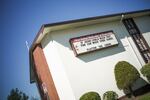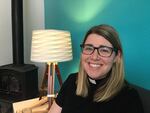Portland Rabbi David Kosak and other clergy members at Congregation Neveh Shalom, have been conducting Friday and Saturday Shabbat services in an empty sanctuary, livestreamed to congregates.
As “social distancing” becomes an increasingly common part of the world’s vocabulary, this is the new normal for Neveh Shalom, and many other places of worship, for the foreseeable future.
Two weeks ago, Oregon Gov. Kate Brown announced guidelines prohibiting all public gatherings of more than 250 people in order to reduce the spread of the ongoing novel coronavirus outbreak.

An empty interior of the Temple at Congregation Beth Israel in Portland, Ore.
Courtesy of Congregation Beth Israel
Last week, she tightened that to gatherings of more than 25.
“This is exactly the time when people need their religious communities and the faith and the strength and the support and the connection, and yet, simultaneously, this is a time when that is being denied,” Kosak said.
Friday and Saturday Shabbat services at Neveh Shalom were already livestreamed, but normally the synagogue saw anywhere from 75 to 350 people coming in-person to the services.
Now all of those people are forced to move online.
Other ceremonies, such as bar and bat mitzvahs, will also need to be conducted virtually or rescheduled for a later date.

A sign at First United Methodist Church instructs people to wash their hands in Beaverton, Oregon, March 20, 2020.
Arya Surowidjojo / OPB
Faith leaders said the biggest issue with only providing livestreaming and virtual services is the lack of interactivity, especially as many people are already feeling isolated.
“Islam is a social- and communication-based religion,” Zakir Khan, board chair of the Council on American-Islamic Relations’ Oregon chapter, said. “And interpersonal relationships are tremendously important for not only practicing the faith but also connecting with one another and spreading the message of the faith.”
Khan said one of the biggest impacts the coronavirus outbreak has had on the Muslim community is the ability to go to a local mosque, specifically for Friday prayer.
“Friday prayer is a pretty big deal for the Muslim community,” Khan said. “Hundreds of people get together at a local mosque to pray in the middle of the work day and then they return to work, or they go on to do whatever they were going to be doing on Fridays. That is something that’s an essential part of being a Muslim-American. … Losing that has definitely created distance and space in the community.”
Khan said many in the community have had to adapt to this by watching live streams of Friday prayer and either praying by themselves at home or with their families.
But, Khan said, “There’s things that they can’t adapt for. You can’t replace walking outside of a mosque and getting access to samosas and pizzas that are being sold and finding a friend that you haven’t seen in several weeks and figuring out how their families are doing, unless you have their phone number.”
Pastor Morgan Schmidt, with the First Presbyterian Church in Bend, had that social disconnect in mind when figuring out what to do for her community.
“[The staff at the church] were in conversations in the last couple weeks to determine how we were going to respond to our community’s needs, given the distinct possibility and now reality that worship would need to be moved online and that large gatherings wouldn’t be recommended,” Schmidt said.
Church staff discussed the logistics of conducting virtual services, she said, and Schmidt was also concerned about keeping her community connected: “How do we connect with our community? How do we make sure people are taking care of each other and not just worry about whether worship is online or not?”
Related: 'Pandemic Partners' In Bend Use Social Media To Care For Neighbors In Isolation
Schmidt created the Pandemic Partners Bend Facebook group with more than 10,000 members — a hub for people to request and offer help to people, such as picking up and delivering groceries and medication.
“Just a way for neighbors to help neighbors,” Schmidt said.
She said although the Pandemic Partners Facebook group is not religious in nature, Schmidt still considers it an extension of her work as a pastor.
“My job primarily is to remind people that they are good and loved and that they have goodness and love to offer the world,” she said.
“We’ve just found a different way of communicating that to an even larger community than our faith community," she said. “This is how I’m choosing to kind of extend that pastoral care to our Bend community and beyond.”

Morgan Schmidt has created resources for people who want to replicate a Pandemic Partners group in their community.
Courtesy of Dave Felton
Kosak, with Neveh Shalom, said the one-way nature of livestreaming is unfortunate for people looking for community and interaction.
To aid that, the congregation also does smaller daily services, now conducted through video conference calls, so that people can see each other and talk.
He said typically about 10 or 15 people showed up for small daily services in-person at the synagogue.
“We had 28 people online, so more than double the normal attendance. It was really powerful,” Kosak said of the first smaller service offered via video chat. “A number of people wrote afterwards and actually had tears in their eyes during it, because we were able to be there for people the way they needed.”
He said he's trying to look at this situation as positively as he can.
“If it’s a way to deepen our relationships, even though you have social distance but maybe not emotional distance, then what a great gift to society, but you have to mindfully plan for that,” he said. “That doesn’t happen automatically.”
